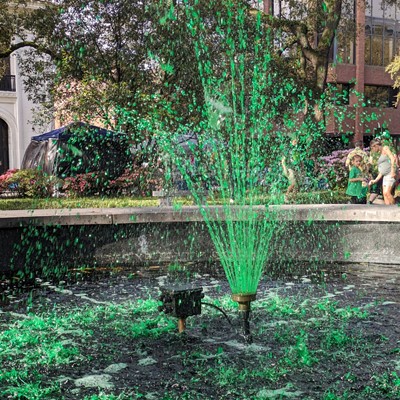A CURBSIDE recycling program is coming to Savannah -- perhaps as soon as the first part of 2009.
The Savannah City Council has approved a 10-year contract with Pratt Recycling of Conyers. The city will operate a single-stream collection program and deliver all recyclables to Pratt - meaning homeowners won’t have to sort items themselves .
However, the council declined the opportunity to sign a 20-year contract that had the potential to be more profitable. City Manager Michael Brown said he had been asked to modify the agreement so the city wouldn’t be required to enter into a 20-year contract.
Randy Hartmann, Environmental Director for the Georgia Department of Community Affairs, advised the city to enter into a 20-year contract with Pratt. “This is important not only for the economy but also from a conservation standpoint,” he said. “Using recycled material is less energy intensive. The energy provided by one aluminum can can operate a lap top for three hours.”
Of the $2 million in DCA grant funding for the establishment of recycling programs, Savannah received $955,000.
Aldermen Larry Stuber and Mary Ellen Sprague voted for a 20-year contract with Pratt, citing economic gains that would be realized. “I think it’s time for us to show leadership,” Stuber said.
However, other council members disagreed, and the 10-year contract carried. “We’re not going to have a mandatory recycling program, which says to me these high expectations may not be enough,” said Alderman Mary Osborne.
“As an attorney, there’s no way I’m going to vote to approve a 20-year contract not one person up here has read,” Alderman Jeff Felser said.
“We need to consider the city councils of 2012 and 2016, 2020, 2024 and 2028,” Alderman Van Johnson said. “Will they go back and say the decision we made today was the best decision?”
Despite the disagreement, city officials are pleased the contract is in place. “Some have criticized us for not being the first to jump in (to a recycling program),” Brown said. “But jumping in at this point, with state, regional and other partners, will move us, if not to the forefront, up among those with the best recycling practices.”
Hartmann said the single-stream system is much easier for residents. “Five years ago, we did require that residents set out different containers for newspaper, glass, and so on,” he said. “That was very burdensome for residents. Today, we realize the need to get the recyclables together and collect it in a single stream.”
Customers will have two bins for refuse — one for garbage, such as food waste, Styrofoam and other non-recyclables; the other for recyclable such as paper, glass, plastic bottles and jars, aluminum and tin. Because all recyclable material goes into the same cart, it is called “single-stream recycling.”
City sanitation trucks will continue to collect household and yard waste. The recyclables will be collected every other week by separate trucks.
All household waste will be buried in the Dean Forest Road Landfill. Yard waste will be put through a giant chipper at the landfill and turned into mulch.
The recyclables will first go to the Pratt Recycling transfer station. This will be located off U.S. 17 in the Kahn Industrial Park, near the old Sam’s Club.
In other business:
The first reading of a strict derelict rental property ordinance was conducted by the Savannah City Council July 31. It will be brought back for approval at the Aug. 14 meeting.
City Manager Michael Brown is ready to move against landlords who rent derelict rental properties. “We have certain individuals causing blight in our community and our community doesn’t deserve it,” he said.
“When you look at the fact we had 5,000 to 6,000 property maintenance violations last year, that really raises a flag,” Alderman Tony Thomas said. “I can drive down any street in my area and tell you what houses are rented, which have long-term residents in them, what houses have potential criminal activity. It’s amazing to me that with all the power the mayor and council has, we can drive through a neighborhood and not be able to do anything about it.”
Thomas said the ordinance will be “the greatest piece of legislation” the council will pass.
“My opinion is that 90 percent of blight can be eliminated by picking up trash and filling trash bags, moving junk cars and mowing,” Brown said. “This ordinance will not put undue hardship on the landlord, it will not put undue hardship on the tenants.”
Alderman Van Johnson recounted two cases where everyone in the neighborhood was impacted by a derelict property. “One lady was living in the dark, taking her bodily waste and throwing it in the back yard,” he said. “Over time, it accumulated to the point where she had the backyard filled with you know what. Imagine the neighbors having to smell that, the rodents that were attracted there.”
In the second case, the top floor of the house had no utilities. “When the dust came down in the apartment downstairs, you could hear literally hundreds of bats above your head,” Johnson said. “It was a scary feeling, thinking that at any moment they could come downstairs. Bats have rabies and everything else, yet that landlord was coming there and picking up his money. It was a victimization of the very people we’re sworn to protect. If they complained, the landlord put them out. If we don’t advocate, it affects everything we are.”
“We’ve talked about absentee landlords too long,” Alderman Edna Jackson said. “I don’t care if you live in Timbuktu, you still have a responsibility to keep property up to standards.”
Alderman Jeff Felser said he knows personally what it’s like dealing with an absentee landlord. “I rented downtown for the last five to six years,” he said. “The absentee landlord was responsible for the roof, but wouldn’t fix it. The landlord was given the opportunity many times to cure the problem.”
The roof was finally fixed after Felser took action against the landlord, but it came at a price. “I was told when the lease ran out, it would not be renewed,” he said. “There is an element of retaliation.”
Mayor Otis Johnson said he is certain the ordinance will be put into law at the next meeting. “It will be a model for the state and perhaps for communities in other states,” he said. “This council is very serious about cleaning up blight.”
























